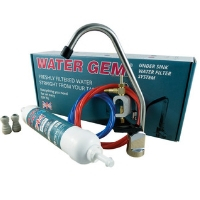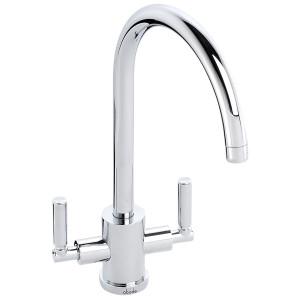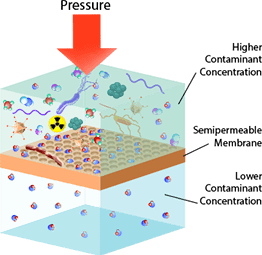Posted on 1st Apr 2019
What is a Water Filter System?
Tap water in the UK is amongst the cleanest in the world , but that doesn’t guarantee it will always taste, smell or look good all the time. In fact, impurities such as chlorine, harmful bacteria such as E-coli and dangerous chemicals such as lead could still potentially reach your home in the form of an isolated outbreak.
In addition, in some hard water areas across the UK water pipes can become clogged with limescale deposits, causing issues with some appliances as well as affecting the taste and appearance of the water. To combat this, many people across the UK will choose to drink bottled water, which has extremely negative environmental effects , or use a filter jug which can be costly whilst also largely ineffective for removing potential impurities.
That’s where a water filter system comes in; it allows domestic or commercial users to enjoy safe, great-tasting water from their tap at any time and without the cost or environmental impact of bottled water or water filter jugs.
How Does a Water Filter System Work?
The basic principle of any water filtration system is to capture the impurities, sediment and other potentially harmful elements from passing through its mechanism.
However, there are a number of different types of water filter system that differ in their effectiveness of removing certain types of impurity. Some of these methods are used as ‘standalone’ prevention methods, whereas others will use a combination of techniques to achieve the desired effect.
If you are unsure of the type of water filter system you require and want to determine which impurities are causing problems with your water, it may be helpful to contact the local water supplier or test your own water to find out its specific chemical properties.
What Types of Water Filter System are There?
Water filter systems remove impurities in water using a number of different methods, yet they also have different applications based on their desired functionality.
Here we look at a number of the most common types of water filter system:
Under Sink Water Filters
Under sink water filters can be fitted, with varying levels of technical difficulty, under domestic or commercial sinks. The filtration system is kept hidden from view so your water outlet appearance remains the same.
There are a number of different types of under sink water filter system, including:
- Water Gem Filters

- The Water Gem is Europe’s best selling under-sink water filter system and is made in Britain from WRAS approved materials.
- Taste Great Drinking Water System
The Taste Great Drinking Water System has been designed to be easily installed without the need for a plumber. It improves the taste and odour of mains water and has been found to reduce chlorine and other chemicals which occur in mains water supplies.
- Doulton Water Filters
The Doulton® water filter is a complex ceramic system capable of removing more than 99.99% of pathogenic bacteria and disease causing cysts and particles.
- Everpure Water Filters
Everpure filters cover a huge range of applications including food-service, vending, coffee and ice machines. There is also an Everpure filtration system desined for domestic use.
- Cryptosporidium Removal Systems
Cryptosporidium Removal Systems have been specifically designed to combat the water-borne bug Cryptosporidium, which has seen several outbreaks in the UK, causing widespread illness. These filters mean that even if an outbreak is present in the mains water supply, water will still be safe to drink from the tap.
Counter Top Water Filters
Counter top water filters are portable water systems which don’t require any plumbing or installation. Ideal for transporting to areas with unsanitary water conditions or also suitable for domestic use.
A popular type of counter top water filter with disaster relief organisations and campers are gravity fed water systems as they do not require any electrical supply or plumbing but still-supply clean water wherever needed.
 Water Filter Taps Water filter taps differ from other types of water filter system as they include the filtration system tap outlet. 3-way flter taps are suited for usages
where hot/cold/combination of water temperatures is required;
standard
filter faucet taps
can be used for when only cold water is required;
and
boiling water taps are effective for
saving power when boiling water is required.
Water Filter Taps Water filter taps differ from other types of water filter system as they include the filtration system tap outlet. 3-way flter taps are suited for usages
where hot/cold/combination of water temperatures is required;
standard
filter faucet taps
can be used for when only cold water is required;
and
boiling water taps are effective for
saving power when boiling water is required.
Water Filter Housings and Head
Water filter housings are built to encase changeable water filter cartridges. They come in a range of sizes and mounting options and can also be used for reverse osmosis cartridges.
Water filter housings can be mounted in various ways and some can even house more than one type of cartridge meaning they are extremely adaptable for different filtration requirements.
Under Counter Chillers
Under counter water chillers/filters supply refrigerated, filtered water on-demand using an electric cooling/filtration unit.
As they fit comfortably inside a counter or worktop, they are highly suited to applications where space is limited such as crowded industrial kitchens.
Calcium Treatment Units (CTUs)
Calcium Treatment Units or CTUs are water filter systems that help to actively combat limescale which can affect the performance of your appliances as well as the taste of the water.
They are primarily used in appliances such as vending equipment, coffee machines, combination ovens, water boilers and baking ovens. CTUs are particularly effective in hard water areas such as the South of England where limescale buildup can cause appliances to perform less effectively and reach their end-of-life markedly quicker than in ‘soft water’ areas of the country.
Most Common water Filters
Here are five of the most common types of water filter system and what they are effective at removing:

Mechanical Filters:
Mechanical filters use a barrier method to remove sediment, dirt and other harmful particles. These filters are made of a network of tiny pores which are measured in microns.
The smaller the micron level the less impurities will pass through – a level of 0.5 microns being sufficient to stop harmful parasites such as Cryptosporidium.
Reverse Osmosis Filters:

Reverse osmosis refers to the process by which a solvent passes through a membrane in the reverse direction to natural osmosis by applied pressure.
The water particles are squeezed through a gap so small that other particles can not and get caught. This highly effective method helps remove dissolved impurities such as magnesium and calcium ions from water and can result in water purity of over to 99.9%, which can be beneficial for certain applications such as coffee machines
Sequestrian Filters:
Sequestration is the process of chemically reducing a substance using another element to counteract its existence. Particularly useful for reducing levels of calcium and magnesium which can cause limescale and corrosion, this method doesn’t soften the water but rather prevents the unwanted elements from forming a scale on pipes and other surfaces which come into contact with your domestic water supply.
Ion Exchange Filters
Ion exchange is the method of softening hard water by altering the chemical compounds found in hard water. The filter enables the exchange of magnesium and calcium (two elements which cause limescale and corrosion) with less harmful ions such as sodium or hydrogen.
Removing these hard minerals means the water performs better under higher temperature, making it well-suited for use in many commercial coffee machines.
Absorption Filters
Absorption filters use a chemical element, usually carbon, to absorb contaminants and improve taste and odour in water.
These filters are ideal for removing unwanted chemicals like chlorine and usually carry a micron rating which specifies the size of particle which can be absorbed by the element.
Not Sure Which Water Filter System Is Best For You?
We know it can be difficult to choose a water filter system as it depends on the specific type and level of filtration. You may need to ask your local water supplier or test your own water supply to know the exact requirements before you choose a water filter system.
If you are unsure of anything with regards to water filter systems, please contact the water filtration experts at Andrew’s Water Treatment today!
 Loading... Please wait...
Loading... Please wait...



